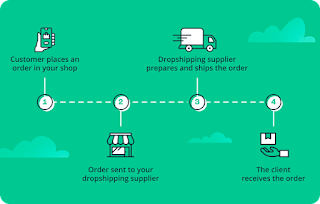Exploring the Best Platform for Dropshipping: Shopify and its Alternatives
Exploring the Best Platform for Dropshipping: Shopify and its Alternatives
In the dynamic world of e-commerce, dropshipping has emerged as a lucrative business model for entrepreneurs looking to enter the market with minimal investment. With several platforms available, choosing the right one can be a game-changer. Shopify, undoubtedly a popular choice, offers a comprehensive set of features for dropshipping. However, it's essential to explore its alternatives as well to make an informed decision that aligns with your business goals. In this blog, we'll delve into the strengths of Shopify for dropshipping and discuss some noteworthy alternatives.
Why Shopify for Dropshipping?
1. User-Friendly Interface: Shopify's intuitive interface makes it an ideal choice for beginners. Setting up an online store, adding products, and managing inventory is seamless, even for those with limited technical expertise.
2. Abundance of Apps: The Shopify App Store provides a plethora of tools designed to enhance your dropshipping venture. From Oberlo for product sourcing to marketing apps like Kit, there's an app for every need.
3. Reliable Hosting and Security: Shopify takes care of hosting, ensuring your website's stability and security. This allows you to focus on your business without worrying about technical glitches.
[Read More:- (Previous Blog) Dropshipping For Beginning, starting with no money]
4. Customization Options: While dropshipping, branding is crucial. Shopify offers a range of customizable templates, allowing you to create a unique and visually appealing storefront.
5. Payment Gateways: With Shopify, you can offer various payment options to your customers, including credit cards, PayPal, and more, making the purchasing process smoother.
6. Scalability: As your dropshipping business grows, Shopify scales with you. It can handle high levels of traffic and sales, ensuring your store remains operational even during peak times.
Noteworthy Alternatives to Shopify
1. WooCommerce: If you're already comfortable with WordPress, WooCommerce is an excellent choice. It's an open-source plugin that transforms your WordPress site into an e-commerce store. Its flexibility allows for extensive customization.
(Read More:- Commercial Products Of daily Use,Upto 75% Discount on First 10 Order )
2. BigCommerce: Known for its scalability, BigCommerce offers advanced features suitable for both small startups and large enterprises. It provides built-in SEO tools and is well-equipped for dropshipping needs.
3. Wix eCommerce: Wix combines simplicity and elegance. With its drag-and-drop functionality, creating a stunning online store becomes a breeze. It's particularly suitable for small to medium-sized dropshipping businesses.
4. Magento: If you're aiming for a highly customizable solution and have technical expertise, Magento is worth considering. It's robust and offers a high level of control over your store's appearance and functionality.
5. Oberlo (with WordPress): While originally a Shopify app, Oberlo can now be integrated with WooCommerce as well. This can be a compelling option if you want the product sourcing advantages of Oberlo but prefer WooCommerce's ecosystem.
(Read More:- Start Earning From Print On Demand T-shirts)
In Conclusion,
Choosing the right platform for dropshipping is a pivotal decision that can influence your business's success. Shopify stands out for its user-friendly nature, app integrations, and scalability. However, exploring alternatives like WooCommerce, BigCommerce, Wix eCommerce, and Magento can help you find a platform that aligns better with your specific needs and preferences. Ultimately, your choice should be based on factors like your technical proficiency, budget, and the scale of your dropshipping ambitions. Remember, the platform you choose lays the foundation for your online success.
Keywords:-
Dropshipping platforms
Shopify alternatives
E-commerce solutions
Dropshipping business
Online store platforms
Best platform for dropshipping
Shopify vs other platforms
E-commerce website options
Dropshipping success
Choosing the right platform
Dropshipping tips
Dropshipping for beginners
E-commerce comparison
Dropshipping profitability
Shopify benefits
Alternatives to Shopify
E-commerce platform reviews
Dropshipping platform features
Growing your dropshipping business
Selecting the right e-commerce platform
Shopify pros and cons
Dropshipping trends
Cost-effective dropshipping solutions
E-commerce scalability
Shopify success stories
Exploring different e-commerce platforms
Dropshipping market analysis
Shopify store setup
Niche selection for dropshipping
Dropshipping platform comparison
Boosting dropshipping ROI
E-commerce platform customization
Shopify app integrations
Dropshipping challenges
Multi-channel dropshipping
Shopify payment gateways
Emerging e-commerce platforms
Sustainable dropshipping practices
Dropshipping platform scalability
Shopify store design
Conversion optimization for dropshipping
E-commerce platform security
Unique challenges of dropshipping
Shopify customer support
Alternative e-commerce solutions
Dropshipping business models
Selecting profitable products for dropshipping
Shopify subscription plans
Diversifying your dropshipping platforms
Social media marketing for dropshipping
Transitioning from Shopify
Niche-specific dropshipping platforms





Comments
Post a Comment